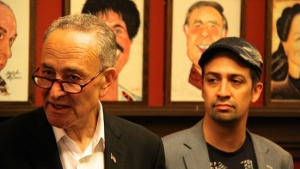 Even if Hamilton creator and star Lin-Manuel Miranda eliminates every electronic “bot” that scoops up thousands of tickets and helps shady brokers resell them at insane prices, he’s unlikely to make a dent in the scalping market. Stung by reports that one bot sold 20,000 tickets to the popular Broadway show earlier this year, and that scalpers made $15.5 million by reselling tickets to 100 performances, Miranda teamed with New York Senator Chuck Schumer earlier this month to announce legislation to fine bot users up to $16,000. “I’m so scared of the way scalpers fuck with prices,” Miranda told Rolling Stone.
Even if Hamilton creator and star Lin-Manuel Miranda eliminates every electronic “bot” that scoops up thousands of tickets and helps shady brokers resell them at insane prices, he’s unlikely to make a dent in the scalping market. Stung by reports that one bot sold 20,000 tickets to the popular Broadway show earlier this year, and that scalpers made $15.5 million by reselling tickets to 100 performances, Miranda teamed with New York Senator Chuck Schumer earlier this month to announce legislation to fine bot users up to $16,000. “I’m so scared of the way scalpers fuck with prices,” Miranda told Rolling Stone.
But while bots are a huge problem in the live-concert business — one software developer bought hundreds of thousands of tickets, then sold them for $31 million via StubHub in 2013, according to New York’s attorney general — they’re hardly the only one in a resale market estimated at $8 billion. “The whole bot thing is something of a smokescreen,” says Rob Wilmshurst, chief executive of See Tickets, which handled Adele’s U.K. tour and has since expanded to Los Angeles. “Blaming R2-D2 for all this is a little bit raw.”
Some artists are still trying to fight back. Adele is one of several touring superstars who’ve tried to prevent scalpers and brokers from obtaining the best seats — for every show on her arena tour, she mandated that buyers of the top 3,000 seats show credit cards to get in. Chance the Rapper tweeted that resellers were “greedy untalented folks who don’t even like music spending a lil bit of money early to come up later” and declared every seat for his Magnificent Coloring Book Festival would sell for $25 through his website. Yet the moves have been largely ineffective: Although Adele set prices for her September shows at Madison Square Garden at $40-$150, tickets sold for as much as $9,500 on StubHub, which calls the singer its best-selling summer artist; Chance tickets are reselling for as much as $500.
Just about everybody involved in ticket sales opposes bots — reps for StubHub, Ticketmaster and the National Association for Ticket Brokers say they support Schumer’s BOTS Act. “They hurt the market, they hurt consumers and fans,” says Tod Cohen, StubHub’s general counsel and head of public affairs. “It’s a terrible way that people have abused systems, and legislation is necessary to help resolve the problem.”
But even without bots, fans would have a tough time grabbing premium seats for the best shows, as they often land on resale sites seconds after a scheduled on-sale (and sometimes even before). In his report earlier this year, Eric Schneiderman, New York’s attorney general, called ticket reselling a “fixed game,” blaming artists, promoters and venues who hold back 46 percent of tickets for “industry insiders.” “They don’t want the public to know so few tickets are available,” says Gary Adler, the NATB’s executive director.
Some artists have no tolerance for scalping — Eric Church regularly voids fan-club sales to buyers who conspicuously fit broker patterns, and Miley Cyrus, Metallica, Radiohead and others have used Ticketmaster’s paperless system, requiring fans to show identification to get into the show. “Bots are a symptom, but they’re not the disease — scalpers are the disease,” says Fielding Logan, who oversees touring for Church and the Black Keys. “If we could do away with the reselling entirely, it’s going to help.”
fit broker patterns, and Miley Cyrus, Metallica, Radiohead and others have used Ticketmaster’s paperless system, requiring fans to show identification to get into the show. “Bots are a symptom, but they’re not the disease — scalpers are the disease,” says Fielding Logan, who oversees touring for Church and the Black Keys. “If we could do away with the reselling entirely, it’s going to help.”
Still, ticket-reselling is legal in most states, and even the biggest artists and promoters have changed their approach as the business has evolved from street-corner hawkers to sophisticated online business dominated by StubHub and eBay. Michael Rapino, head of top promoter Live Nation, has encouraged artists to raise ticket prices to compete with scalpers — which Hamilton did in June, boosting top seats from $475 to $850. And Live Nation-owned Ticketmaster encourages artists to participate in its own resale services, such as TM+ and TicketsNow. Those companies ban “speculative selling” on tickets that have not yet been made available to the public — like season ticketholders for sporting events who know they’re going to get Madonna seats as part of their packages. “We weed out the bad actors,” says Joe Berchtold, Live Nation Entertainment’s chief operating officer.
For now, the most public way of dealing with scalping involves fighting the bots, as in Schumer’s BOTS Act and an identical 2015 bill in the House. Longtime anti-scalping artists are supportive of these efforts, but skeptical on how effective they’ll be. “The issue I have is, a lot of bot transactions don’t take place in the U.S.,” says Stuart Ross, tour director for Tom Waits. “It’s like Whack-a-Mole. The average fan doesn’t have a chance.”
– Rolling Stone





